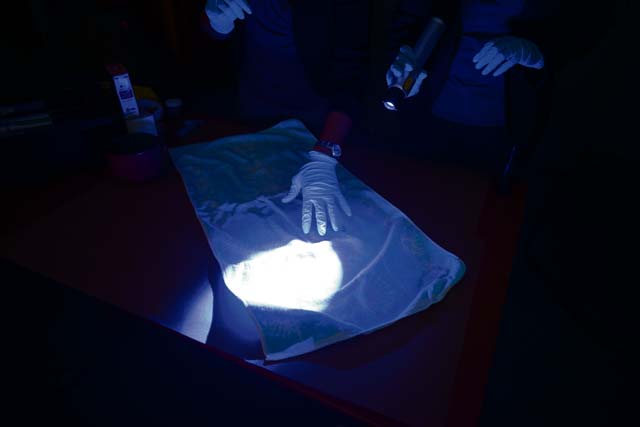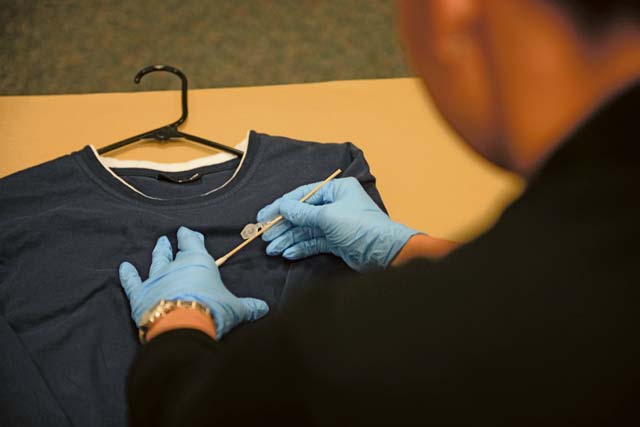
When hearing the word “special agent,” a stereotypical sleuth might come to mind: a man sporting a trench coat while holding a magnifying glass in one hand and a tobacco pipe in the other.
Although this stereotype might not fit Air Force Office of Special Investigations agents, one thing is for certain: they have sworn to enforce the law, and they will do what it takes to bring criminals to justice.
“If an Air Force organization is ridden with crime, it cannot properly do its job,” said Lt. Col. Neil Whelden, 13th Field Investigations Squadron commander. “The commitment of the people who work here to fight crime is second to none.”
The 13th FIS is one of many AFOSI units, and it services Air Force interests in the entire Kaiserslautern Military Community.
“I am extremely optimistic about this unit,” Whelden said. “I serve with great people with an excellent work ethic. For this reason, I feel blessed. Our job here keeps us busy. No two days are the same, and there’s never a dull moment.”
There are three different categories in which 13th FIS agents operate: criminal investigation, anti-fraud and counter-intelligence.
Criminal investigation deals with homicide, domestic and drug abuse, felonies and other crimes.
Anti-fraud is the financial protection aspect of Air Force operations. Agents track the money of the Air Force to ensure it goes to its proper recipients and is used for proper purposes.
Counter-intelligence is the information protection arm of AFOSI, where agents are responsible for making sure the U.S. government’s adversaries do not gain any information which would give them a window into the Air Force’s operations.
“We investigate anything that may do harm to the U.S. Air Force, this base or the personnel here,” said Special Agent Rudy, 13th FIS. “If someone is spying against the U.S. military, our job is to investigate that person.”
Whether as simple as briefing an Airman going on vacation to a foreign country or engaging in a psychological chess match with enemy operatives to prevent them from accessing important information, counter-intelligence agents work hard to protect the warfighting capabilities of the Air Force.
Being an AFOSI agent is not easy; the risks and hazards that come with the job of law enforcement are real.
An agent may be exposed to a crime scene’s chemical or biological hazards or face a disgruntled suspect looking to harm them.
Therefore, practicing situational awareness, risk management and operations security is a must for AFOSI agents.
“The threats are broad, especially on deployment,” Whelden said. “We go outside the wire on a regular basis.”
Despite these threats, serving in the AFOSI has its rewards.
“Doing this job made me realize that there’s more to just the Air Force itself: it’s keeping the people safe,” Rudy said. “That’s what keeps me going every day; it’s a very rewarding career.”
For an enlisted Air Force member to become an AFOSI agent, a person must undergo a rigorous selection process, which includes an extensive background check, interviews, financial checks and a medical clearance. Upon passing all the requirements, the Airmen are sent to a 20-week training course.
“Our primary focus is in the staff sergeant corps (for enlisted applicants),” said special agent Rosa, 13th FIS. “You usually have to be either a staff sergeant or a staff sergeant select. We rarely hire senior airmen unless they’re very sharp.”
Rosa explained that not everyone can handle the job of an AFOSI agent, and those who wish to join must be ready to deal with the dark side of the career.
“It’s challenging,” Rosa said, “At times, it’s scary, and it’s definitely dangerous.”
However, Rosa believes the work AFOSI agents do is necessary.
“The intelligence we get is saving lives,” Rosa said. “In the end, when you see the results and impact, it is definitely very humbling … and very rewarding.”
Although the nature of crime can be unforgiving, the 13th FIS Airmen are determined to catch the perpetrators and serve justice, Whelden said.
No matter how hard the case may be to crack, the Airmen of the 13th FIS are committed to serving and protecting Air Force interests in the KMC.








